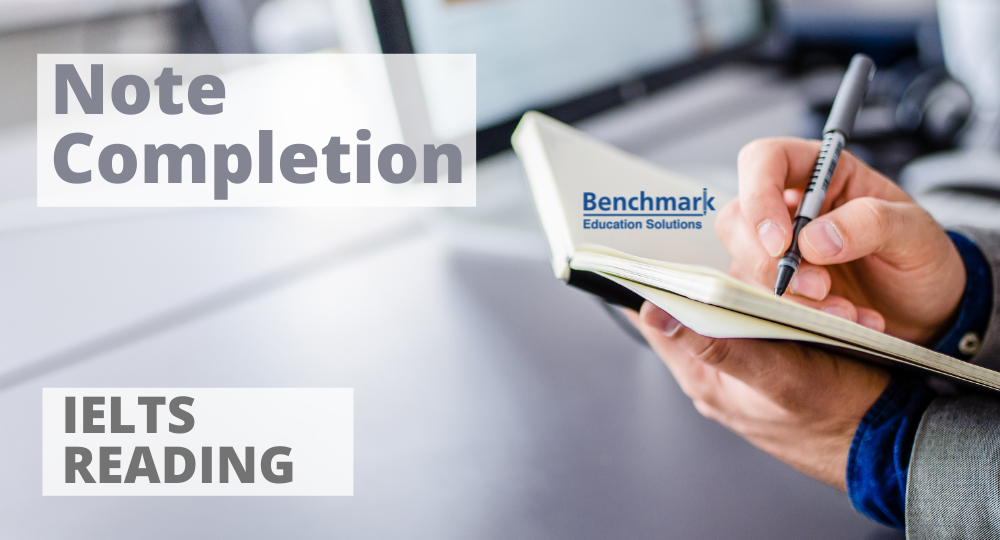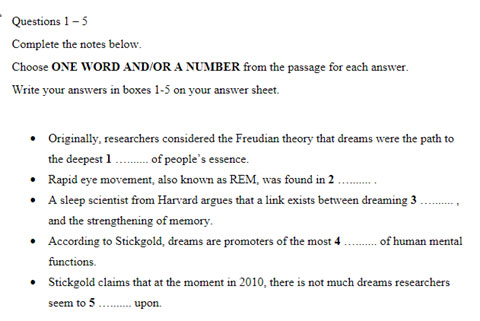

Table of Contents
1. What Is Note Completion?
Note completion involves filling gaps in a set of incomplete notes. In IELTS Reading, the notes will be sentences that will contain gaps. These sentences will summarise ideas from the text, and you will need to find words from the text that fill the gaps in the notes.
Like many Completion tasks, a common concern for test-takers is ensuring that they understand the gist (general meaning) of the text to be able to locate the answers, which requires strong skimming and scanning skills.
2. IELTS Reading Note Completion Example


3. Top 5 General Tips to Use in All IELTS Reading Question Types
- Always read and make sure you comprehend the instructions
- Skim the text – read it quickly to understand its gist (general meaning)
- Scan the text – read it quickly to look for detailed information
- Answers should not be left blank – there are no negative answers in IELTS, so when you are unsure, give it your best try at including the most appropriate answer you can find.
4. Note Completion Question Type Tips
4.1 It is crucial that you read the instructions very carefully. The instructions will indicate the word limit available to you to answer the question. Instructions may say ‘USE NO MORE THAN 2 WORDS’. This means that the only acceptable answers will either be 1 word from the passage or 2 words from the passage, but no more than that. For more information on such instructions, click here.
4.2 Make sure you only use words taken directly from the passage. You may not use your own words to fill in a gap, as such answer will not be accepted.
4.3 IELTS Reading Note Completion is about understanding the meaning of the text. Look for the title which will contain key language and information you can paraphrase (express in different words), so that you get an idea of what the text is going to be about.
4.4 The notes will be incomplete sentences with gaps that paraphrase an idea in the text, which means that they will say what the text says in other words. Therefore, when looking for the answers in the text, do not look for the exact same words as in the notes. Most of the words will be different in the text. You must paraphrase the words in the notes, and look for those new words in the text.
4.5 There will be some language that can be paraphrased like verbs and nouns and their synonyms (e.g. = ‘focus’ also means ‘concentrate’, ‘admiration’ also means ‘awe’). Other language, like names and dates will not be paraphrased, but may easier to spot in the text.
4.6 Answers do not necessarily come in order, so effective skimming of the text is essential. Read the passage quickly but make certain to understand what you read. Rushing without understanding will delay the process as you will need to go over the text more than once, and could also cause you to misinterpret the content.
4.7 While skimming is key, scanning is also necessary when looking for answers in the passage. Once you have skimmed the text and paraphrased the notes, it is time to look for the new words in the text using scanning skills. Look for that new language and read carefully around it when you find it, to decide on your final choice of words for your answer.
4.8 The grammar used in the notes will be a great indicator of the type of language to look for as your answers. When studying a note, ask yourself: will the words that fill the gap need to be a noun? A verb? An adjective? Once you have determined the type of language, you can locate your synonyms/paraphrased language and choose the appropriate words by reading around them.
4.9 Make the best use of your time, and only allow up to 2 minutes for text skimming. To get an idea of what the text is about, it often helps to read the first and last paragraphs of the passage, as well as the topic sentences (first sentence of each paragraph).
5. Good to Know
5.1 Instructions that inform you of your word limit can be confusing. Here is a detailed explanation on how to interpret them:
Example: YOU MAY USE NO MORE THAN 3 WORDS AND/OR A NUMBER
Meaning: You may use:
1 word OR 2 words OR 3 words OR 1 number OR 1 word + 1 number OR 2 words + 1 number OR 3 words + 1 number
5.2 Numbers expressed in letter form with more than one word (‘twenty-two’ instead of ‘22’) count as one word. In this case: ‘fifty-four people’ should count as 3 words, but ‘fifty-four’ count as 1 word, so ‘fifty-four people’ will be considered 1 number + 1 word.
5.3 Words with hyphens (-) such ‘high-spirited’ or ‘low-key’ count as one word.
5.4 Although answers do not always come in order, they tend to be found in a specific part of the passage rather than scattered throughout the passage.
6. Example
7. Mock Test
The Purpose of Dreams
When we wake to an early alarm, cutting off the last hour or two of sleep, the sleep we sacrifice is mainly REM, “rapid eye movement,” the most dream-rich stage of sleep. We dream in all stages of sleep, not just REM, but our most vivid, memorable and emotionally resonant dreams and stories that play through our heads like films, occur mainly in the stretch of REM just before we wake up in the morning. A normal sleeper, a good sleeper, spends about a quarter of sleep time in REM, so a person who lives 90 years will spend 6 or 7 years in REM.
When researchers discovered REM in 1953, they were ecstatic to find that the eye movements were associated with dream recall. Most researchers studying the mind those days were Freudians, and Freud saw dreams as “the royal road to the unconscious”. Researchers therefore thought they had found the route to the innermost recesses of the self. It was not quite that simple, of course, as subsequent findings about the workings of the brain did not bear out Freud’s ideas, and the focus of dream study shifted to the neurological bases of dreams, their physiological rather than psychological origins, the ebb and flow of neurotransmitters. At present (as of 2010), there is “precious little on which dream researchers agree,” says Harvard sleep scientist Robert Stickgold. His work suggests an association of dreaming with learning and the consolidation of memory. Stickgold finds that when people are awakened out of REM and given a word to associate to, their associations are more novel, more original than in other stages of sleep; they “ignore the obvious and put together things that make a kind of crazy unexpected kind of sense.” Dreams, Stickgold says, are where we bring things together in fresh, often startling ways, drawing on stores of knowledge from the past, the present, the possible, to find new associations. Dreams, far from being idle fancies, are enablers of “the most sophisticated human cognitive functions.”
At the 2009 Associated Professional Sleep Society (APSS) meeting in Seattle, P.F. Pagel, University of Colorado Medical School, described a study he did with the Filmmaking and Screenwriter Labs in Sundance that found a much higher recall and use of dreams among actors, writers, and directors than among participants from his sleep centre: dream use increases, he concludes, in proportion to a person’s interest in the creative process or product. It figures that filmmakers have this kind of generative conversation with their dreams, since film is, of all human creations, probably the most dream-like. There are, of course, highly creative and productive people who have little or no dream recall. But dreaming may still work behind the scenes. And creativity is not exclusively for writers or artists, it’s about basic survival, about finding new paths, figuring out what to do when something goes drastically wrong. We need to think creatively and flexibly, as we negotiate relationships with colleagues, co-workers, family or friends.
Questions 1 – 5
Complete the notes below.
Choose ONE WORD AND/OR A NUMBER from the passage for each answer.
Write your answers in boxes 1-5 on your answer sheet.








